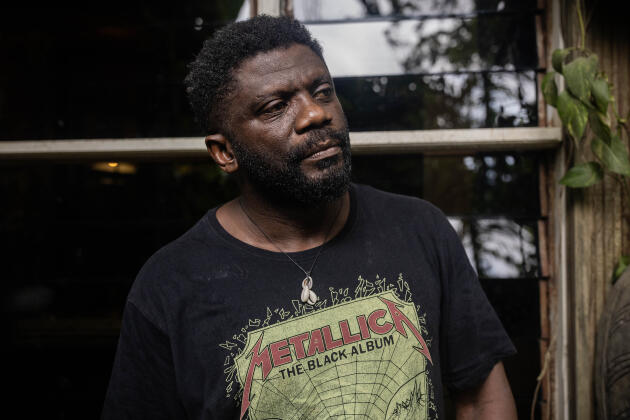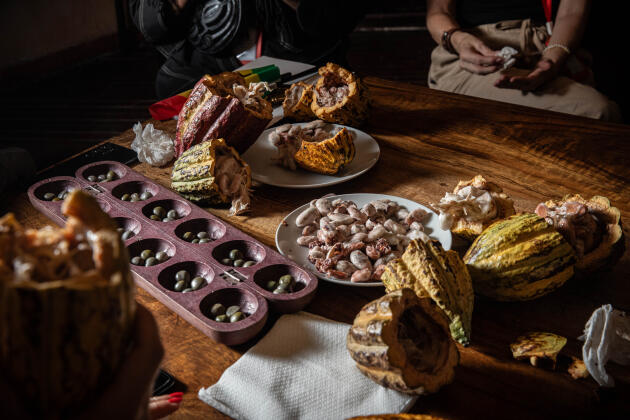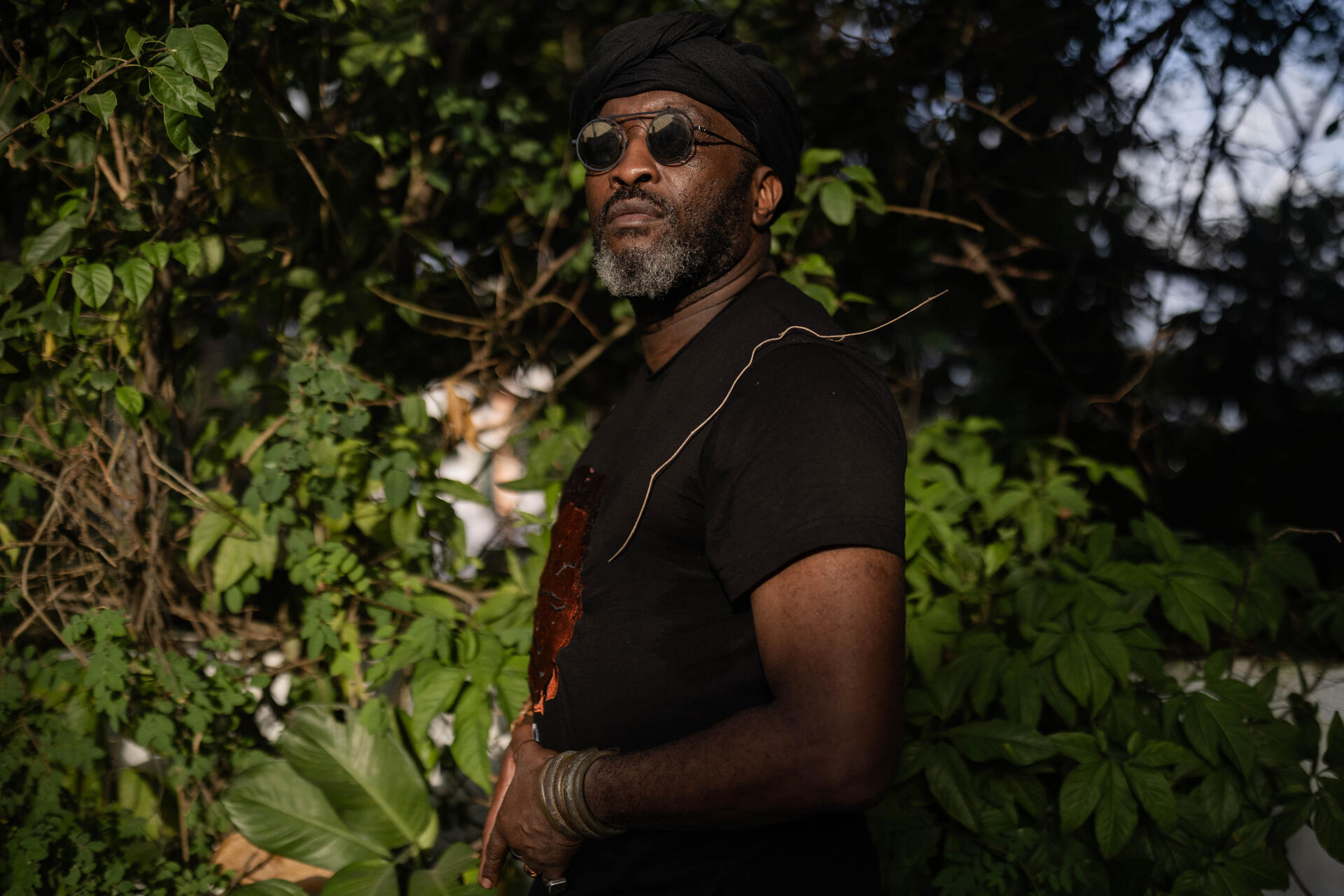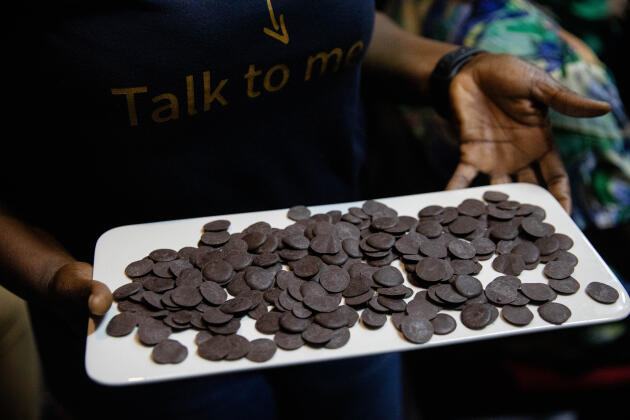The Bushman Café in Abidjan always smells of cocoa, but its aroma is particularly heady that day in the small meeting room on the ground floor. A few chocolate bars as dark as oil are placed on trays, offered for tasting to the ten privileged guests invited by the owner of the establishment, Alain Kablan Porquet, himself an artisan chocolatier at the head of the cooperative Cocoaïan.
But be careful, you don’t bite into a 92% cocoa chocolate like an industrial chocolate bar. “Put the chocolate in your mouth and bite very lightly to release the flavors, says Kristen Hard, multi-awarded American chocolatier and owner of the high-end boutique Cocoa Atlanta. Then let the puck melt on your tongue. You can inhale at the same time to fully capture the aromas. » With a solemnity reminiscent of oenology, we taste in turn Ghanaian and Ivorian chocolates, those from FairAfric and Cocoaïan, whose cocoa content is 75 or 92%.
These little pucks, with delicate notes of flowers or fruit, are the first samples of a greater ambition: that of transforming a cocoa nation into a chocolate nation. The paradox is known: Ivory Coast alone supplies 45% of the world cocoa market, but half of the beans are exported raw and almost all of the rest in the form of semi-processed products.
The country has only 24 chocolatiers, Ghana half as many. To expand the market – he aims to multiply their workforce by ten in the coming years – Alain Kablan Porquet brought together Ghanaian and Ivorian players in the cocoa sector from November 2 to 4, even as the Salon du chocolate. The immediate objective is to create a new specifically African chocolate competition, the World Chocolate Initiative Competition, the first edition of which should be held in mid-2024.
Ultimately, this will involve launching a debate on chocolate production standards defined by European markets. And to open a new cocoa era where power would return to the producing countries, while the price of brown gold broke new records on October 30 on the London and New York Stock Exchanges, galvanized by the low harvest of cocoa. current quarter, which could turn out to be almost 30% lower than last year.
“Chocolate is culture!” »
“Chocolate is not a consumer product!” thunders Gauz on the low sofa that the Bushman Café reserves for its speakers. This is pure thought, pure intellect! It’s culture! » In front of the restricted audience of journalists, industrialists and researchers, the Ivorian writer, author in 2022 of the book Cocoaiansgets carried away: “ Cocoa is not a local plant. It was imposed on us by a European bourgeois whim. Cocoa is an issue of civilizational thought, the site of a confrontation between African farmers, who produce this cocoa by destroying their ecosystem, and the hyperbourgeoisie, who invented the taste of chocolate and imposed it through violence. »
The 2.4 million tonnes of cocoa that leave the fields of Ivory Coast each year? “2.4 tons of misfortune! asserts Gauz. The first crime we committed, and it is a collective crime, was to have perpetuated the colonial economic system. Coffee, cocoa, rubber, oil palm… We haven’t produced anything new! It is this idea that must be put back at the center of the debate. We must rethink a class relationship, a relationship of domination. »


To reverse this relationship, Alain Kablan Porquet pleads for “ the non-nomadization of food”. Between two workshops, he sits in a corner of the Bushman Café, on a Louis XV armchair which apparently belonged to Valéry Giscard d’Estaing. “We aim for everything to be done on site, he explains, like wine or haute couture. We can move beyond this role of supplier of raw materials to market, on the local and export markets, a high quality finished product. »
Because he is convinced of it: alkalization systematically practiced by industrial chocolate makers ” kill “ Cocoa. “The potash is intended to level out the taste. Bitterness, astringency and acidity are removed. But if there is a need for that, it’s because there was a fermentation problem from the start! » His bet is to buy fresh pods from Ivorian farmers, just out of the field, to carry out the shelling, fermentation and drying himself. The producer saves time and money (Cocoaïan buys the beans above the minimum price set), and the chocolatier maintains control over his raw material from the start. All this should make it possible to “turn the pebble into a diamond”, assures Alain Kablan Porquet, that is to say to produce “fine cocoa” from Forastero pods, the variety grown in West Africa.
“It’s a niche market that’s opening up”
The Ivorian chocolatier used a fermentation method invented by Dutch consultant Albertus Eskes, former researcher at the Center for International Cooperation in Agronomic Research for Development (CIRAD), “married to cocoa for fifty-three years”, by his own admission. Its “Anima” technique, developed in Brazil from 2015 to 2019 and recently applied by certain producers, including Cocoaïan, eliminates the bitterness and astringency of the bean without artificial alkalization, with guaranteed effectiveness on any variety of cocoa. “It’s a simple and inexpensive method, swears Albertus Eskes. It can be applied by all farmers, throughout the world, without adding yeast grown in the laboratory, with simply crates of fruit. »

Far from wanting to protect their secret, Alain Kablan Porquet and Albertus Eskes invited state representatives to convince them to deploy the method on a large scale. Beyond the competition, the objective is to establish a national certification for cocoa production, based on the implementation of Anima fermentation. The Coffee-Cocoa Council (CCC) was present on the first day for closed-door discussions, and the National Center for Agronomic Research (CNRA) on the following days.
Enthusiastic, the cocoa breeder and scientific coordinator of the CNRA, Mathias Tahi, plans to meet the CCC soon to share his observations and, perhaps, launch a public-private partnership on a national scale. “ The world must know the great capacities that Côte d’Ivoire has to produce quality cocoa.he announces. For us, it is a niche market that is opening up, with much greater added value for the entire sector. » The certification also provides for a small revolution: total transparency on prices. Farmers will thus know at what price the chocolate produced from their beans is sold.
